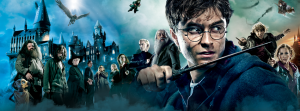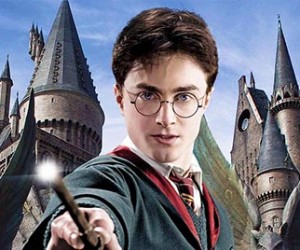It may seem obvious that Harry Potter is a hero. After all, he does save the world from the evil that is Lord Voldemort. But what kind of hero is he? According to Goethals and Allison’s (2012) taxonomy of heroism, Harry fits best in the traditional hero category, in which the hero completes the the class hero’s journey as described by famed mythologist Joseph Campbell.
Throughout the series’ cumulative 4100 pages, Harry follows the major stages of the hero’s journey: departure, initiation, and return. When we first meet Harry, he is an obedient, insecure, and lonely boy who lives in a closet. He has no friends and no one who cares about him, and he accepts that this is his life. Fortuitously, Harry is plucked out of this mundane life, never to return again. In this new world, he is famous, adored, and is expected to do great things.
In his initiation stage, a second taxonomic system can be included in defining Harry Potter as a hero. Harry belongs in the category of underdog, an important hero-type in Franco, Blau, & Zimbardo’s (2011) taxonomy of heroism. He is in a world where everyone exceeds him in knowledge and experience. At Hogwarts, almost all the students grew up with wizards, and have had exposure to magic. Harry is an underdog on the traditional hero’s journey.
This underdog theme persists throughout the various books: he is the only first-year Quidditch player, is more sensitive to the dementors that are brought into Hogwarts than the other students, and is the only under-age  student in the Triwizard Tournament. Most importantly, his archenemy, Lord Voldemort, is a brilliant wizard with powerful wizards as his allies. Harry is an amateur wizard, and his allies are amateur wizards for the majority of obstacles he faces.
student in the Triwizard Tournament. Most importantly, his archenemy, Lord Voldemort, is a brilliant wizard with powerful wizards as his allies. Harry is an amateur wizard, and his allies are amateur wizards for the majority of obstacles he faces.
Inspiring underdogs often emerge as leaders. Harry has had various labels assigned to him, including “The Boy Who Lived”, “The Chosen One”, “Undesirable Number One”, and “a lying show-off”. There’s no denying that Harry embraces his role in the war against Voldemort, and he begins to become a leader. He heads the rebel organization Dumbledore’s Army, is Quidditch Captain, and is ultimately commander-in-chief of the Battle of Hogwarts, which results in the defeat of Lord Voldemort and the Death Eaters. His influence is so strong that people continued to fight and die for him even after they thought he was dead.
His death suggests that Harry fits into a second category in Franco et al.’s taxonomic structure of heroes, the martyr. In one of the final chapters of the books, Harry sacrifices his own life in order to defeat Lord Voldemort and save the world. But even before his ultimate sacrifice, Harry risks his life to help others. Harry completes dangerous tasks to stop Lord Voldermort from reaching the Sorcerer’s Stone, enters the Chamber of Secrets to save Ginny Weasley’s life, and almost drowns saving Gabrielle Delacour. In Harry Potter and the Deathly Hallows, Harry breaks into the Ministry of Magic, Gringotts, and Hogwarts under the risk of capture and subsequent death in order to destroy the Horcruxes and thus Lord Voldemort.
One could say that Harry’s return stage begins after he dies. After Lord Voldemort “kills” him, he talks to his mentor, Albus Dumbledore, and finally learns all the information to defeat Lord Voldemort. As with all great heroes, Harry returns to Earth, his transformation complete. He can finally complete his journey, and although he never physically returns to the Muggle world where he started, he is rejoined with everything he loves. After coming back from the dead, Harry is the true heroic leader everyone expected him to be.
References
Allison, S. T., Goethals, G. R., & Kramer, R. M. (2017). Setting the scene: The rise and coalescence of heroism science. In S. T. Allison, G. R. Goethals, & R. M. Kramer (Eds.), Handbook of heroism and heroic leadership. New York: Routledge.
Goethals, G. R., & Allison, S. T. (2012). Making heroes: The construction of courage, competence, and virtue. Advances in Experimental Social Psychology, 46, 183-235.
Franco, Z. E., Blau, K., & Zimbardo, P. G. (2011). Heroism: A conceptual analysis and differentiation between heroic action and altruism. Review of General Psychology, 15(2), 99-113.
